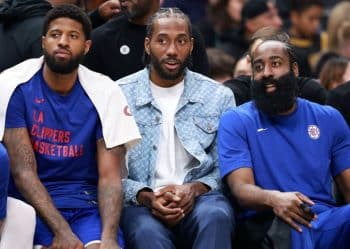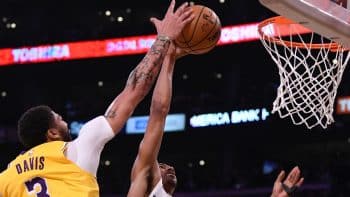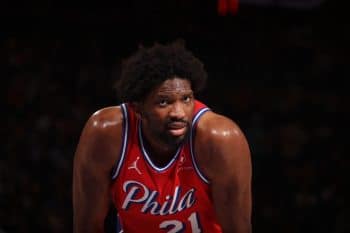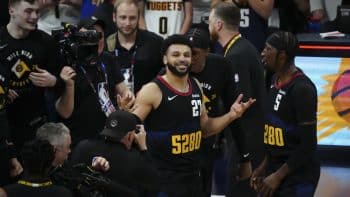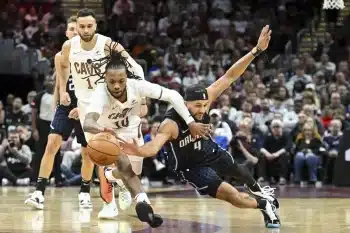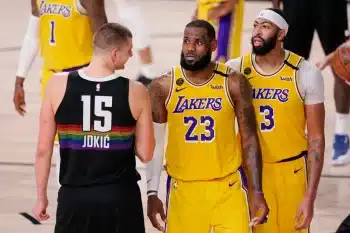NBA
Motor City Blues: On the Trouble in Detroit

You can hear a pin drop in the Detroit Pistons locker room 30 minutes after Friday night’s loss to the Utah Jazz. It’s the team’s third straight loss and second straight blowout in two nights, and their 11th defeat in their last 15 games overall. Coach Stan Van Gundy has just finished a brief, tense session with media. Point guard Reggie Jackson speaks in tones barely loud enough for recording equipment to pick up.
“It’s been a season from hell so far,” Jackson says. “It’s going to be a long-ass season if we don’t find a way to fix it.”
In this case, “it” refers to a precipitous slide from a group many considered a prime candidate to leap a few spots in the East and perhaps even compete for a home playoff seed in round one. The Pistons sit five full games back of that perch in the loss column, 11th in the conference and facing a serious uphill battle just to make it back to last year’s eight-seed and a likely rematch with the world champions.
Things didn’t start out this way. The Pistons were 4-2 out of the gate before a tough stretch of schedule in mid-November slid them back under .500, but the signs on the margins were mostly positive. Jackson had still yet to play a game with knee and thumb issues, and the slightly positive per-possession net figure the Pistons were posting at the end of November had to count as a small victory in this light – especially with 10 of those first 20 games coming against the Toronto Raptors, Los Angeles Clippers (twice), San Antonio Spurs, Cleveland Cavaliers, Oklahoma City Thunder (twice), Houston Rockets and Boston Celtics (twice).
“For the first 21 games, we were the second-best defensive team in the league,” Van Gundy said. He’s technically slightly off, but not enough for anyone to care – the Pistons were fifth in per-possession defense to this point, but not much separated the top five teams. Unfortunately, his follow up was just as close to accurate: “Now we’re one of the worst.”
Since that 22nd game – which, coincidentally, was the one where Jackson finally returned to the lineup – Detroit is 23rd in the league defensively. They’re even worse on offense in that stretch, and the league’s fifth-worst per-possession team.
“We can’t stop anybody. We just can’t,” said Van Gundy. “I’m frustrated – not with our players, I’m frustrated with myself that I can’t figure this out. We literally can’t stop anyone, ever.
“I think over [our last] 12 or 13 games, teams are shooting over 45 percent from three. I know all the numbers.”
Again, he’s virtually spot-on – teams are shooting a fairly insane 45.5 percent from deep in Detroit’s last 12 games, eight of them losses. They’re giving up over 36 points a night just from the long ball, a figure that would easily lead the league on the season.
In fairness, some of this has been outright bad luck. The Pistons are only giving up about an average number of open and wide open threes during that stretch, per SportVU data, but teams are nailing them at totally unsustainable rates over the last few weeks. In their last 12 games, teams have hit over 51 percent of their “open” threes (defender within 4-6 feet) against the Pistons – no other team is even allowing over 46 percent on these same shots, and there isn’t much you can do about that bit of variance.
Injuries have been an issue lately as well. The team’s best wing stopper, Kentavious Caldwell-Pope, left Thursday’s game in Golden State and likely won’t return on the team’s current road trip. They’ve also missed Jon Leuer for a few games, and a few other guys have been in and out here or there. It’s tough to really chalk the issues up to these ultimately brief absences, though, especially after the team was .500 without Jackson for the first part of the year.
“It’s tough losing KCP. It’s tough losing Jon [Leuer],” said Jackson. At the same time, though, Jackson isn’t willing to use that as an excuse for the team’s defensive struggles, nor should he be. “I don’t think those two are – they’re great players, but I don’t think just those two make our defense. So all 15, we’ve just got to find a way to compete, find a way to come out and get stops.”
To hear it from Jackson, a big part of the issue is consistency in effort. He talks about how the team will play halves or stretches of the defense they expect, but can’t come close to sustaining it for 48 minutes.
There’s also a real chance their struggles on the other end are impacting things. The Pistons are just 25th in the league offensively since the start of December, and maintaining a high level of defense gets tougher without the adrenaline rush of made shots.
“Too many times, we’re letting our offense, and lack of making shots at times, really dictate how much effort we put out on defense,” Jackson said. “We’re not just playing simple basketball and understanding who we’re guarding, or where they want to be.”
The conversation surrounds the team and broad concepts, but at some point the whispers are going to shift to individuals. Those conversations will start with Jackson and Andre Drummond, the team’s ascendant would-be stars.
Detroit gave Drummond and Jackson over $200 million in future money over the last two summers, a huge investment in two guys who, to this point in the season, have been major on-court negatives. The Pistons are consistently destroyed with their preferred starters on the floor. Detroit would be the league’s best defense if they only counted the minutes when Drummond sits; they’d be a bottom-five unit if they only counted the minutes when he plays.
This isn’t even a staggering issue, either: The team is still better with neither key player on the floor than it is with just one. Van Gundy might consider trying a bit more staggering, since at least those units with one or the other are getting killed a bit less than while both play together, but that feels a lot like a Band-Aid on a fracture.
Both guys hold real responsibility. Jackson consistently struggles with lapses in focus and his ability to stay in front of guys at the point of attack, boasting the 69th-best Defensive RPM rating of 85 point guards in the NBA (RPM helps account for teammate and opponent context, among other things). He’s also having a down year efficiency-wise on the other end, though you wonder whether some of that is adjusting since his injury return.
Drummond is the largest point of concern, though. A guy some people had labeled as the next big thing down the middle has plateaued badly the last couple of years and has even regressed in some areas this season. Being the best rebounder in the league is great, but it only counts for so much when your value in nearly every other area of the game is limited or non-existent.
It starts with interior defense, where it’s legitimately tough to understand how a player with so much physical skill could be so incapable. Drummond has fluctuated between bad and horrible relative to league average among volume rim protectors over the last two seasons, per SportVU data. He currently ranks 106th of 125 players defending at least three shots at the rim per night, with a 55 percent figure allowed that’s nearly 15 full points higher than the game’s elite rim protectors.
“He’s got to get better in that area. He hasn’t been as good a basket protector as he probably should be,” Van Gundy said of his young big man. “For us to become a real good defensive team, he’s got to improve in that area.”
Watch tape of this Pistons team defensively, and you see a group that needs an anchor, even actively looking for one, and everyone knows where it should be coming from. The Pistons didn’t pay Drummond $127 million to rebound, dunk occasionally and do nothing else. They paid for the promise of a defensive centerpiece.
“I don’t think he’s established that, no. I don’t think he’s established that,” Van Gundy said. “It would certainly help us if he’d become a better rim protector.”
At this point, it’s fair to wonder if it’s possible. Drummond is 23 and is now in his fifth NBA season. There comes a point where guys are either going to get it or they aren’t. He clearly isn’t lacking any physical element, but is constantly out of position and seems allergic to the idea of verticality. He swipes with one hand at shots he’d destroy just by going up straight with both arms raised. It’s almost comical how little rim runners seem to fear him, even smaller guys who should be intimidated by one of the most athletic bigs in the league.
Couple that with some other issues and you worry whether Drummond is really the franchise player many were hoping for.
He’s always been good-to-great as the roll man in pick-and-roll sets, generating a per-possession point score in the high 1.1 range the last couple of years, per Synergy Sports. This is elite for a volume big man, so it begs a loud question: Why is Drummond finishing under half as many possessions in this role as he is from the post, where he’s among the two or three worst volume players in the league?
Drummond has shot a brutal 40 percent from the post the last two seasons, generating a per-possession scoring figure even the league-worst 76ers offense would laugh at. Every post possession he uses is one of the biggest wins possible for the defense, but he does this over twice as often as he finishes as a roll man.
Some of this might be on Van Gundy, but a big chunk is on Drummond himself. He sets lazy screens and is often totally unwilling to come back up and try again if the first attempt doesn’t work – he’ll often just lope down into the post on these occasions. Some of it falls on the ball-handlers as well. His turnovers have gone back up after a major effort to bring them down last year.
Put it all together, and don’t be surprised if whispers start to circulate about a big change in Detroit. This team had higher aspirations this year, but they’ve seemed to get worse as they’ve brought their whole squad together on the floor. Now they’re back to dealing with injuries and the locker room is fraying.
Drummond hasn’t gotten any better for at least two years, and while it sounds a bit rushed, his window for value in a potential move could shrink quickly once folks catch on. There will always be a spot for the best rebounder on earth, and someone out there would give a king’s ransom for a guy this young, assuming they could teach some of the finer points he’s clearly still missing.
It’s probably too early for those conversations. Van Gundy has been pleased with Drummond’s work ethic of late, particularly as a rim protector, and the Pistons still have a shot at a playoff spot and a matchup with someone other than Cleveland if they can get Caldwell-Pope back sooner rather than later.
Whether it’s personnel or more of a metaphorical thing, though, this team needs a shakeup. They look lifeless on the floor, and as Jackson notes, their window for the playoffs is shrinking. The answers aren’t going to just present themselves, though.
“I don’t know,” Van Gundy said when asked point blank what the issue was. “If I did, I would have done it already.”
